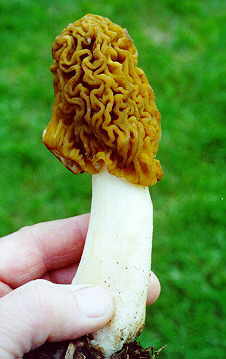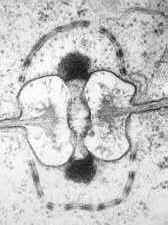Course Instructor: Dr. Chet Cooper, Associate Professor Lecture Day/Time: Tuesdays and Thursdays, 2:00 PM - 3:15 PM Location: Ward Beecher Science Hall Auditorium, Room 3022 Laboratory Day/Time (BIOL 6948 Only): Tuesdays, 3:30 PM - 6:20 PM Location: Ward Beecher Science Hall, Room 2006
|
|||||||||||||||||||||||||||||||||||||
|
Welcome to "Biology of Fungi"
 I am Dr. Chet
Cooper, your course instructor for BIOL 4848/6948, Biology of Fungi. BIOL 4848 is three
semester-hour upper-division course at Youngstown State University
(YSU)
intended for undergraduate students majoring in biology, but students
majoring in
chemistry or any of the
other "hard" sciences may also find this course quite beneficial. BIOL 6948 is a four semester-hour
graduate student version of this course. The major difference is
that graduate students enrolled in BIOL 6948 will be expected to
perform at a higher level of scholarship, including active
participation in the integrated laboratory component of the
course. I am Dr. Chet
Cooper, your course instructor for BIOL 4848/6948, Biology of Fungi. BIOL 4848 is three
semester-hour upper-division course at Youngstown State University
(YSU)
intended for undergraduate students majoring in biology, but students
majoring in
chemistry or any of the
other "hard" sciences may also find this course quite beneficial. BIOL 6948 is a four semester-hour
graduate student version of this course. The major difference is
that graduate students enrolled in BIOL 6948 will be expected to
perform at a higher level of scholarship, including active
participation in the integrated laboratory component of the
course. As your instructor, I am wholly committed to providing you a sound education in the foundations of fungal biology, which is also known by the scientific term "mycology" [myco = fungi; ology = the study of]. With the same commitment on your part, I guarantee that your experiences in this course will give you a different and accurate perspective of the role that fungi play in our daily lives. The BIOL 4848/6948 Home Page has
been
constructed to contain all the
necessary information that students need to actively participate in
this course. In
essence, it represents my syllabus for Biology of Fungi. In addition,
this and the other web pages associated with this course provide a
number of valuable resources for learning the
principles of mycology. Embedded within this web page are
numerous links to various documents, web sites, and current information
that form an integral part of BIOL 4848/6948. These links are
provided
as buttons, like those in the right-hand column of
this web page, or as underlined
words/phrases
Lycogala epidendrum, a type of
slime mold
[taken from The Fifth Kingdom on CD-ROM, 2005; © Bryce Kendrick] As your first assignment for this course, carefully and completely read through this web-based syllabus for BIOL 4848/6948. If there is something that you don't understand or is not clear, please tell me. I will be happy to alleviate your misunderstanding or confusion. Pay particular attention to the section entitled "Acknowledgement of Syllabus" on the Course Policies web page. A Syllabus Acknowledgement Form (SAF) must be downloaded, completed and submitted to me no later than 2:00 PM on January 30th. My policy is that I will not administer any assignment, quiz, or examination to a student until the form is submitted. In other words, you will receive no grades or scores for this course without my having received from you a completed SAF. In essence, by reading, signing, and submitting this form, you signify that you have accessed and reviewed the web syllabus as well as agree to abide by all of its requirements and policies. I very much look forward to an exceptional enjoyable semester as your mycology instructor. Should you have any questions or comments about anything related to this, please be sure to contact me. Best Wishes for a Great Semester in BIOL 4848/6948, Biology of Fungi!  Course Description: The lecture portions of this course will examine members of the fungal kingdom as well as fungal-like organisms. The teaching emphasis will be placed upon their taxonomy, phylogenetic relationships, cell structure and function, growth, reproduction, physiology, genetics, and ecology. Specialized topics related to the role of fungi in agriculture, medicine, and scientific research will be explored as well. Students wishing to enroll in this course must have taken BIOL 3702 (Microbiology) (or its equivalent at another institution) and passed the course with a grade of C or better. If you have not yet had BIOL 3702, but have taken BIOL 3711 (Cell Biology: Fine Structure) or BIOL 3740 (Plant Diversity), see Dr. Cooper regarding an exemption for the pre-requisite. The lecture for both undergraduate students (BIOL 4848) and graduate students (BIOL 6948) will meet twice per week on Tuesdays and Thursdays during the Spring 2007 semester from 2:00 PM to 3:15 PM in Room 3022 of Ward Beecher Science Hall. In addition to the lecture session, graduate students must participate in a laboratory section integrated into BIOL 6948. The laboratory is schedule to meet once per week on Tuesdays during the Spring 2007 semester from 3:30 PM to 6:20 PM in Room 3009 of Ward Beecher Science Hall. However, students should be aware that extra time outside of the scheduled laboratory period will be required for certain portions of the exercises to be conducted in this course. Those graduate students wishing to take this course, but having conflicts with the scheduled laboratory section due to teaching commitments should see Dr. Cooper. Course Goals and Objectives: The goal of BIOL 4848/6948 is to prepare students for professional careers in a biological-related field that employs the principles of fungal biology. This goal will be achieved through the mastery of the following specific objectives:
Course Materials: Dr. Cooper suggests that students not buy any of the required or recommended texts until after the first class meeting! After reviewing a number of textbooks for this course, including new, old, and classical texts, not one completely satisfies Dr. Cooper's vision of a comprehensive presentation of fungal biology. Therefore, Dr. Cooper has chosen a slight twist on a more classical form of teaching this course. The lecture portion of the this course for all students will come mainly from material covered in Deacon's text (see below). The information provided therein will be supplemented with additional material from a variety of sources, some of which are available to students through books, literature, and the internet. As indicated below and elsewhere in this web syllabus, some of these materials can be viewed on reserve in the Maag Library, some can be downloaded for free, and others can be purchased from different sources. It is the student's option. For graduate students, there is one additionally required text for the laboratory portion of their enrollement in this course - Hall's book on the development and understanding of phylogenetic trees. Graduate students will also be required to keep a laboratory research notebook. Finally, I have placed all of the required texts on reserve as well as few other items listed below. Please be courteous of others in your use of these books. Also, if your budget is really stretched tight, you may be able to acquire these books via interlibrary loan.
Dr. Cooper's Contact Information: Dr. Cooper welcomes the opportunity to interact with students outside the classroom and encourages you to visit him as often as needed. However, Dr. Cooper has two general requests: i) please don't just "drop in" to his office outside office hours unless it is absolutely critical for you to do so, and ii) please don't visit him the hour preceeding lecture when he is busy preparing for class. Otherwise, Dr. Cooper holds five office hours per week (days/times listed below). If these do not fit your schedule, please call or email Dr. Cooper with times/dates that you are open so he can schedule an appointment with you. And, most importantly, do not wait until the day before or the morning of an examination to seek help from Dr. Cooper.
Course Policies: Additional information regarding BIOL 4848/6948 can be found in the Course Policies web page. Click on the button below to access that site. Be sure to carefully read the policies, then submit the Syllabus Acknowledgement Form to Dr. Cooper by the stated deadline. Assistance with the BIOL 4848/6948 Web Pages: A very important fact that every student in BIOL 4848/6948 should know: Dr. Cooper is not a computer geek!
Dr. Cooper has absolutely no clue as to how computers and software work, neither does he care to learn the intricate details. He has struggled mightily in just learning how to put this web syllabus together. Hence, students are advised that he can be of no help whatsoever in assisting you in solving problems such as "Why can't I download the PDF document?" or "I can't open the document that I downloaded!" That being noted, if students do have a problem with this web page, please do notify Dr. Cooper. The problem may be as simple as a broken or inaccurate link which can be readily solved. Beyond that, contact the YSU Tech Desk by telephone at 330.941.1595 or by email at techdesk@cc.ysu.edu for help with your particular situation. |
Course
Related Links
Dr. Cooper's
Contact Information
Office Hours: (WBSH, Room 4015) - Mondays - Fridays, 11:00 AM - 12:00 PM - Other times by appointment only Telephone/Voice Mail: 330.941.1361 Email: crcooper01@ysu.edu
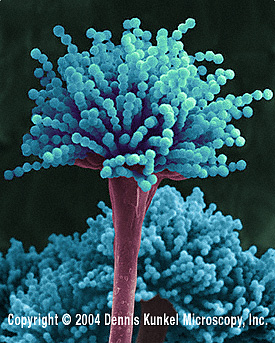 A false colored image of the conidia and conidiophores of Aspergillus versicolor as observed under a scanning electron microscope. This image is used with the expressed permission of Dr. Dennis Kunkel, who also holds the copyright to this and other images used throughout this course web page. To see more stunning images like the above, as well as other microbes, visit Dr. Kunkel's web page at www.denniskunkel.com. Course
Related Links
No, that's not a goiter!!! The Biology Department's own Mr. Ed Budde displays a giant puffball fungus that he picked earllier that day from his own yard. In case you are confused, Ed is the guy on the left! (Image © Chet Cooper)  The sporangium of Absidia corymbifera (Phylum Zygomycota) containing numerous sporangiospores [courtesy of Dr. Michael McGinnis, University of Texas Medical Branch] Course
Related Links
<> <> The face of this
striking individual belongs to Dr. Ira Salkin, Dr. Cooper's first
boss/mentor after earning his Ph.D. Dr. Salkin is recently
retired from the New York State Department of Health where he served in
numerous capacities including Director of the Mycology Laboratories.
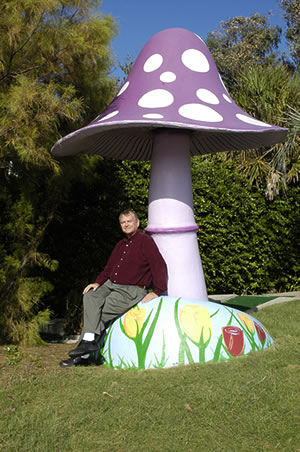 Dr. Cooper's good friend and colleague, Dr. Michael McGinnis, a reknown medical mycologist, resting under one of his new discoveries - Gargantiagaricus lavendera. To learn more about Dr. McGinnis and his research interests, search for his home page at the following URL: http://www.utmb.edu/pathology. [photo taken from a recent article in the UTMB Magazine; Copyright © 2005 University of Texas Medical Branch]
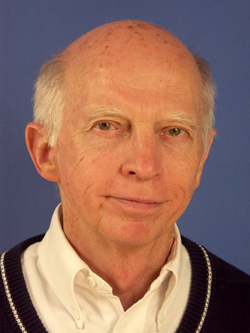 This distinguished gentleman is Dr. James
L. Harris, currently of the Texas Department of Health. On
occasion, Dr. Harris teaches mycology at the University of Texas at
Austin. Dr.
Cooper's first experiences with the fungi came through undergraduate
mycology courses taught by Dr. Harris at the University of Pittsburgh
at Johnstown. [The above photo was taken from the following web
site: http://www.biosci.utexas.edu].
<>Course
Related Links
<>
<>  This
handsome dude is Dr. Cooper's former mentor and major professor, Dr.
Paul Szaniszlo, of the University of Texas at Austin. Dr.
Szaniszlo is an expert in the molecular biology of fungal
morphogenesis, particularly of those darkly pigmented fungi that cause
the diseases termed phaeohyphomycosis and chromoblastomycosis. To
learn more about Dr. Szaniszlo and his research interests, point your
web browser to the following URL: http://www.sbs.utexas.edu/mycology.
|
||||||||||||||||||||||||||||||||||||
|
|
|||||||||||||||||||||||||||||||||||||
This web page was
created using the Composer function of Netscape 7.2. Buttons used in this
web page were created using ButtonGenerator.
Viewing This Web Page: The web pages associated with this course were produced by Dr. Cooper using the Composer function of Netscape 7.2. While most web page browsers will read these electronic documents, their structural integrity seems best served by Netscape 7.2 and above.

web page were created using ButtonGenerator.
Viewing This Web Page: The web pages associated with this course were produced by Dr. Cooper using the Composer function of Netscape 7.2. While most web page browsers will read these electronic documents, their structural integrity seems best served by Netscape 7.2 and above.
Copyright ©
2005-2007 Chester R. Cooper, Jr.

































